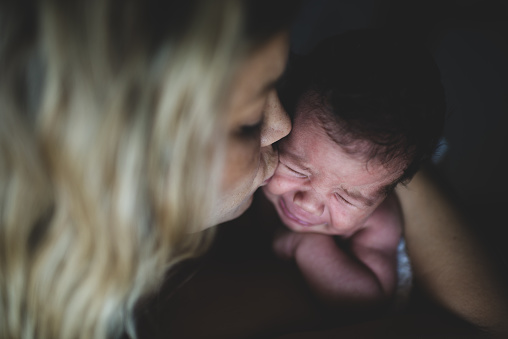
Birth Memories And Birth Without Violence
Amazing brain of the foetus and newborn Research is beginning to prove that newborns are not just listening to their mothers voice but are also thinking of these sounds as evidenced by a frenzy of electrical activity in their brain.
Memories of birth in later life
We know that newborns can hear and think, so it is possible for them to have a memory of their birth. This could be like a 'fossil' embedded somewhere in their subconscious. Initially, modern medical science had rejected the entire concept. But perinatal psychologists, yogis, hypnotherapists, hydro therapists and psychiatrists have encountered the retention of birth memories in patients during psychoanalysis, under drugs, LSD, hypnosis and other modalities.
Especially if the patient is helped by a 'rebirther' or a primal therapist a definite birth memory can be retrieved. New researchers keep an open mind about these reportings as thousands of birth stories pour in from people all over the world.
Common emotions in birth stories
Many preschool children (2 to 3 year olds) when asked casually by their mother, "Do you remember your birth?" come out with astonishing stories. Comparing the narratives with what the actual scenarios were, most of the mothers were shocked that the child could even have the slightest understanding of the environment described. The descriptions ranged from,
'It was like a dark tunnel', or
'I came out of a swimming pool', or
'I was crying because I felt cold', or
'Daddy touched me first' or 'I travelled along a funny road and came out through a hole.'
Not every child will remember their birth stories. Some children may tell them after being asked and some may tell them spontaneously. For example, entering a swimming pool for the first time, a baby may say, "Mummy, you have a pool in your tummy too' Traveling through a dark tunnel at night, a baby said "I was so tired when I traveled from your stomach outside, I did not like the big light which suddenly came into my eyes".
Memories given by young adults - Under a hypnotic spell or during drug use, many adults come out with spontaneous stories. Many of these have also had difficult births and those experiences seem to resurface in these accounts. Certain common sentences like these are heard :
"I am cramped in here,"
"I hate being pushed so fast and suddenly"
"I don't like the cold surface. Why are they putting a tube in my throat?" "The noise and lights of the room are troubling me."
"Father was not confident of holding me, but you immediately put me near your chest." "I was wrapped in a blanket in another room, but I wanted to be near you."
"I was relieved to be finally pushed out, but my mother took one look at me and said, 'I wish it was a boy!""
"I wasn't breathing well, the doctor said, 'He's still blue. Give him more oxygen.""
"The nurse gave me some sweet water (glucose solution) and said, that should keep her quiet for some time"
Whenever parents of preschool children complain of some persistent behavioral problem for which they can see no cause, we inquire about the birth history and any psychological trauma in the mother's life at that time. Very often, if some positive history can be elicited the child psychologists can work on that piece of information with improved outcomes.
Information about birth stories is beautifully given in Dr. David Chamberlain's book "The Mind of your unborn child" (North Atlantic books, Berkeley). Readers are invited to send any narratives or stories told by children or family members regarding their birth to the authors. A worldwide compilation on this subject of cross cultural birth stories would go a long way, in changing the outlook of doctors and nurses in maternity hospitals and parents of newborn babies, towards their interaction with newborn babies and credit them with more inteligence and sensitivity.
Fredrick Leboyers concept of 'Birth without violence'
The baby in the womb is secure and relaxes in the dimly lit womb and floats in the warm amniotic fluid. At birth it is suddenly exposed to the cold external environment, the bright lights of the labour room and the noises of the hospital personnel. According to Fredrick Leboyer, this instills in the baby a fear of the event of birth which remains in his subconscious mind for many years. According to the Leboyer principle of 'Birth without Violence' if the immediate external environment is made more baby friendly in the labour ward the newborns will have a more pleasant memory of their birth. We try to follow his methods whenever possible. He recommends the following at the time of birth of the baby:
1) Dim the lights of the labour ward.
2) Avoid loud noises made by the hospital personnel or machines (e.g. suction machine and metal instruments, trays etc.)
3) Let the parents, (mother or father) hold the baby immediately after delivery in their arms with his head to the left side of the chest so that the baby is soothed by the skin to skin touch. 4) Immerse the baby in a tub, of warm water with
his feet touching the walls of the tub so that it
gets a feeling of being in the womb with its feet as if touching the uterine walls. 5) The mother should gently talk to or hug and
caress the baby as much as possible.
The first five minutes after birth are very important for mother child bonding. However, this precious period is often wasted in cleaning, weighing and wrapping the baby. We insist that the mother touches the baby even if she is not comfortable or confident of holding it alone. Only after a few minutes of bonding should the baby be taken to the nursery for weighing and dressing up.







